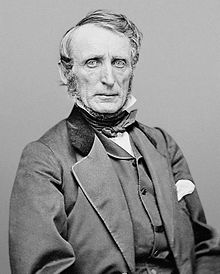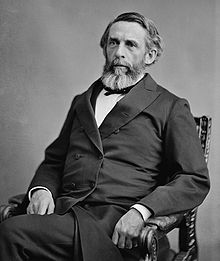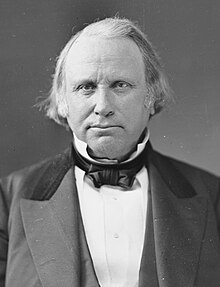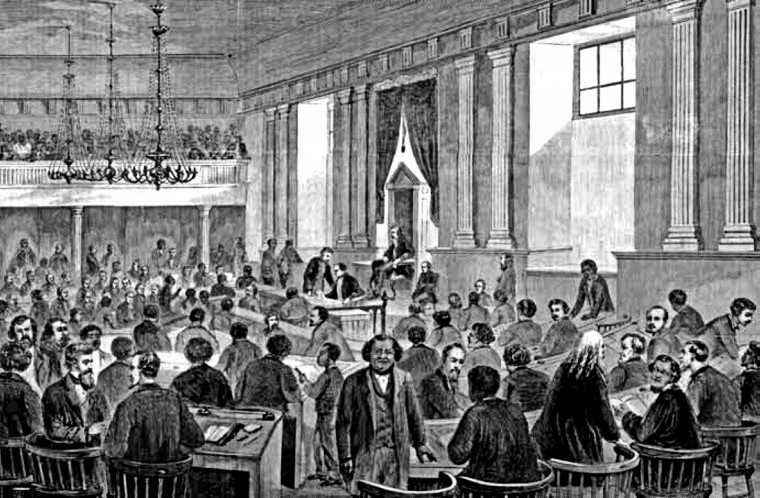Chapter One Hundred and Forty Nine
Domestic Bliss: Part One
Secretary of the Treasury Salmon P. Chase
From “Chasing the White House – Salmon P. Chase and his Campaign to be President” by Albert Niven
Grosvenor 2001
“For Secretary Chase the victory in the Slaveholders’ Rebellion had only been won because he had personally ensured the Federal Government had remained solvent. His tally of the war was one of battles won and lost certainly, but not in the fields of Virginia or on the banks of the Mississippi, but in the halls of Congress and in the banking houses of New York…
While Stockdale’s surrender ended the war for most Chase continued to fight his battles for what he viewed as the necessary outcome of his four exhausting years in the Treasury Building, a Chase Presidency…
Re-appointed to the Treasury after Lincoln’s re-election Chase was faced with the herculean task of returning the nation’s finances to a more normal footing. He had several objectives: the first of which was to reduce the amount of counterfeit currency in circulation. It was estimated up to a third of all paper and specie in the country may have been counterfeit at this time…
Stanton’s success in ensuring the Secret Service answered to him further deepened Chase’s loathing for the man. The friendship born in Columbus twenty years earlier was dead, at least as far as Chase was concerned. After the swearing in of Chief George Sharpe as the first head of the Secret Service Chase referred to Stanton as “
selfish, insincere, a dissembler, and treacherous"…
Stanton had serious concerns about the greenbacks in circulation. He feared his creation had the potential to destabilize the economy and, as its author, his reputation. He declared that no more paper currency should be issued. He sought to consolidate the government’s substantial debt, framing measures adopted by congress which permitted the consolidation and funding of the government loans into 4% and 4.5% bonds…
The prohibition on issue of further greenbacks was not enough. He was confronted in the late Spring of 1865 with rising inflation. The cause: the government's wartime issue of greenbacks. Chase recommended the phased retirement of the fiat paper and a return to the gold standard. Come fall the problem had become worse and he strongly urged the retirement of the greenbacks and a subsequent resumption of specie payments…
Chase’s stewardship of the nation’s finances during the war had been nothing short of superb and, whatever the President’s misgivings about Chase’s personality, he trusted him implicitly on financial questions. Indeed so too did many in Congress. So his proposals met with support. However it would be wrong to say they were ever popular with any faction in Congress. Any reduction in the supply of currency was going to be unpopular during the postwar reconstruction and continuing national expansion…
The Currency Adjustment Act was passed in early 1866, authorizing the retirement of not more than $10,000,000 in six months and not more than $2,000,000 per month thereafter. The Act would be repealed by the 40th Congress after less than $32,000,000 in greenbacks had been retired. Chase’s plan had been derailed by the Supreme Court’s support for the constitutionality of fiat money as legal tender [
the cases of Hibbert v Downey and Towler v Van Decker will be reviewed the a subsequent Chapter on the Supreme Court]…
Chase claimed no small hand in drafting Section 5 of the Fourteenth Amendment, though it is now accepted he was merely consulted by Holt and the Congressional drafters. Nonetheless it was during his term in office that the principle was enshrined in the Constitution that, not only was the debt of the so called Confederacy repudiated, but that any debts incurred in the pursuit of rebellion or insurrection against the United States would forever be void for their unlawfulness…
During the remainder of his tenure Chase maintained a firm policy of reducing the nation’s accumulated war debt and the careful reintroduction of federal taxation in the South. He desperately wished to oppose the cost of the post-war expansion of the army but feared crossing Kearny who’s popularity knew no bounds and the Radicals who’s vengeance knew none either…
While he successfully re-established the mechanisms for collecting taxes in the South the depression of the Southern economy meant the revenue was disappointing throughout the latter half of the 1860s…
The compensation for Chase was his perceived control of the Bureau of Collectors and its ever growing revenue. Chase believed he had the measure of Jacob Cox and Cox was happy to oblige him, at least in the liberal appointment of Ohioans. Whether Cox was promoting Chase’s cause or his own was not a question that crossed Chase’s mind… ”
From “The Rivals – Lincoln and his Cabinet” by Amelia Doggett
Grosvenor 2008
“After the jubilation of passing the 13th Amendment Congress quickly turned inwards to re-examine its own workings with the view of meeting the postwar needs of the nation. The first step the House took was to split the function of the mighty Committee on Ways and Means into three parts. The passage of legislation affecting taxation would remain with Ways and Means under the chairmanship of John Armor Bingham of Ohio. The power to regulate banking was transferred to the Committee on Banking and Commerce under George S. Boutwell of Massachusetts. The power to appropriate money, in effect to control the federal pursestrings, was given to the newly created Appropriations Committee. Thaddeus Stevens took control of the Appropriations Committee despite the best efforts of more orthodox Radicals. It was a rare occasion during the 39th Congress that Benjamin Wade did not get his way, but then as Lincoln noted any Senator that stuck his hand “
into the embers of the House and stirred them about was liable to get his fingers burnt”…”
John A. Bingham, George S. Boutwell and Thaddeus Stevens
From “The Court of Reconstruction – the David Davis Court” by Robert Yelland Hoke
MacFarland Legal Press 1997
“The Judicial Circuits Act of 1866 reorganized the United States circuit courts and provided for the elimination of one seat on the Supreme Court of the United States upon the death or retirement of the next Justice. It was signed into law in May 1866 by President Lincoln. Davis had proposed a redrawing of the judicial circuit boundaries, reducing the number of circuits from ten to nine. He also believed it made sense for the eventual reduction in the number of seats on the Supreme Court from the ten that had been authorized in 1863 to nine. One for each circuit. The plan had the endorsement of Attorney General Speed…”
From “The Noblest of Undertakings” by T. Peck Williams
University of Virginia 2008
“The work of the 39th Congress in promoting, for the common good, the station of the freedman was constant…
The attempted passage of the Southern Homestead Act of 1866 saw the Radical Republicans split and indeed many conservatives were clearly divided. The proposal, boosted strongly by Oliver O. Howard of the Freedmen’s Bureau, was that freedmen, poor tenant farmers and sharecroppers in the south should have the right to apply for the lands now held under the stewardship of the Bureau of Collectors in the South…
The proposal was that the act should open up over 60 million acres of public and confiscated land for sale in the Southern states. It was to be parceled up into 160 acre plots and homesteaders would be required to occupy and improve the land for five years before acquiring full ownership…
Benjamin Wade decried the proposed legislation. The southern states were in the midst of constitutional conventions which would lead to the presence of Southern Unionists and African-Americans in the 40th Congress. Should not “
the loyal men of the Southern most parts of our Union have a say in the distribution of this, their most precious resource – Southern land”. George Washington Julian said it was "
repugnant to all principles of justice to charge men for the ownership of land made fertile only by their toil, their blood and that of their fathers." Wade had an eye to winning the support of the republicans who would inevitably be returned from the south in the impending midterms. He was not alone. Fearing a loss of the Treasury Department’s Kingdom constituted in the assets managed by the Bureau of Collectors Secretary Chase and Director Cox put their strength into the balance against passage of the Act. The alliance of leading Radicals, Ohioans and less scrupulous members who saw the Act as the waste of a source of party spoils, saw the Act was defeated…
Howard had accepted the post of director of the Freedmen’s Bureau on a temporary basis. The failure of the Southern Homestead Act was, to him at least, a personal blow. He tendered his resignation to Secretary Stanton immediately following the voting down of the Act. Within a matter of days General John J. Peck was summoned from his Headquarters in Savannah and offered the appointment of Director…
In stark relief to Howard's resignation, Peck’s appointment would be met with passage of the Second Freedmen’s Bureau Bill. As though in recompense for the failure of the Southern Homestead Act Congress promptly renewed the charter for the Bureau. More importantly it was not only refunded but its funding was increased from the revenue collected by the Bureau of Collections. President Lincoln joyfully signed it into law in the summer of 1866...”
John J. Peck - "Shepherd in Chief" of the Fighting Lambs would now become shepherd of a whole race










